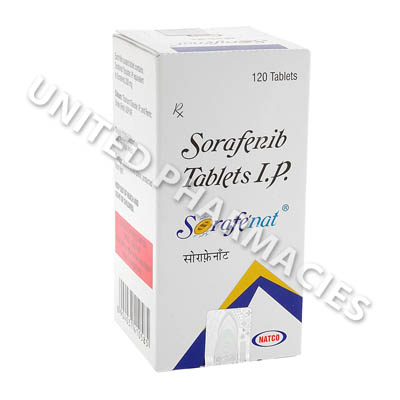Customers also like
Cotellic (Cobimetinib Fumarate) - 20mg (63 Tablets)
from only £2229.00
Veenat 100 (Imatinib) - 100mg (120 Capsules)
from only £121.03
Capegard-500 (Capecitabine) - 500mg (10 Tablets)
from only £22.56
Erlocip-150 (Erlotinib) - 150mg (30 Tablets)
from only £228.15
Erlocip-100 (Erlotinib) - 100mg (30 Tablets)
from only £174.92
Description
| Main Use | Active Ingredient | Marketed Name |
| Liver or kidney cancer | Sorafenib Tosylate | Sorafenat |
Uses
Sorafenib (also called Sorafenib Tosylate) is a new treatment for hepatocellular carcinoma (a type of liver cancer). It is used in cases where the cancer cannot be surgically removed. It can also be prescribed for advance renal cell carcinoma (a type of kidney cancer) and for some cases of thyroid cancer. Sorafenib works by blocking certain abnormal proteins that trigger cancer cell reproduction. It is what's known as a is a kinase inhibitor.
Dosage and Administration
The usual dosage of Sorafenat is 200mg twice daily, but your doctor will give specific instructions. Take Sorafenib on an empty stomach - allow one hour before eating or two hours after eating. Tablets should be swallowed whole with a glass of water.
Sorafenib needs to be taken as long as prescribed by your doctor. It is important you do not stop taking Sorafenib or reduce the dose if you begin to feel better. Only change if advised by your doctor.
Side effects
Sorefenib may cause some side effects. Some are mild and should go away over time, while others can be more serious and require medical attention.
The following side effects are common. They will often be mild and temporary. Tell your doctor if they persist.
- tiredness
- weakness
- skin redness
- hair loss
- itching
- dry or peeling skin
- loss of appetite
- constipation
- diarrhea
- dry mouth
- weight loss
- joint pain
- numbness, pain or tingling in hands or feet
- headache
Tell you doctor immediately if you notice any of the following side effects while taking Sorefenib:
- unusual bruising or bleeding
- black and/or tarry stools
- red blood in stools
- bloody vomit
- vomiting material that looks like coffee grounds
- fever
- severe stomach pain
- nausea
- vomiting
- chest pain
- shortness of breath
- dizziness or fainting
- sweating a lot
- fast, pounding, or irregular heartbeat
- sudden severe headache
- confusion
- changes in vision
- seizures
- rash
- redness, pain, swelling or blisters on the palms of the hands or soles of the feet
- mouth sores
- dark urine
- yellowing of the skin or eyes
- pain in the upper right part of the stomach
Precautions
If you have any allergies, especially to any medicines, you must tell your doctor before taking Sorefenib. Also tell you doctor about any prescription or over-the-counter medicinces you are currently taking.
Sorefenib may not be a suitable treatment if you have high blood pressure, bleeding problems, chest pain, heart problems, kidney problems other than kidney cancer, or liver disease. Check with your dcotr if you suffer from any of these.
Sorefenib can decrease fertility, so tell your doctor if you are pregnant or planning to become pregnant, breast-feeding or planning to breast-feed.




-Cap-100mg-UK-1s.jpg)
-Tab-500mg-UK-1s.jpg)
-Tab-150mg-UK-1s.jpg)
-Tab-100mg-UK-1s.jpg)



